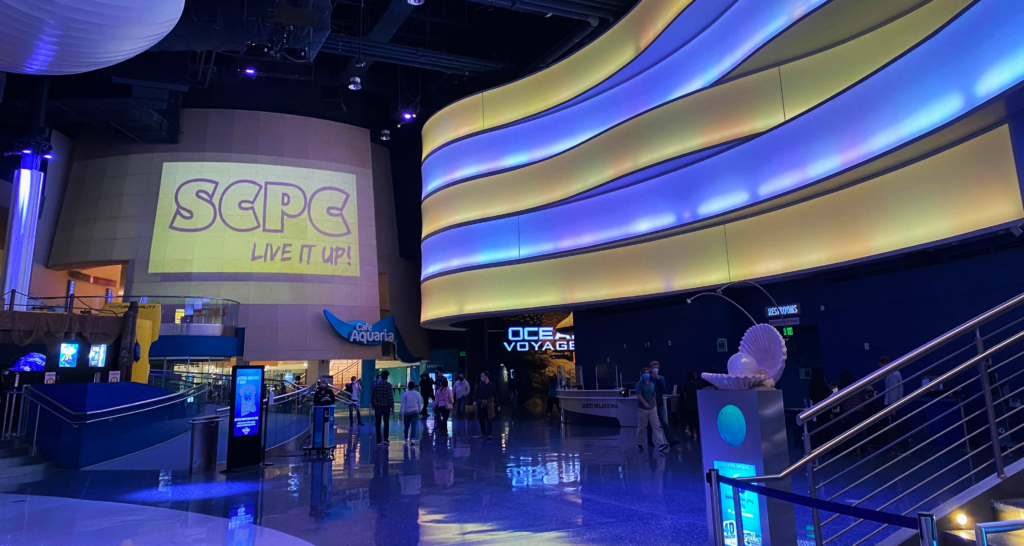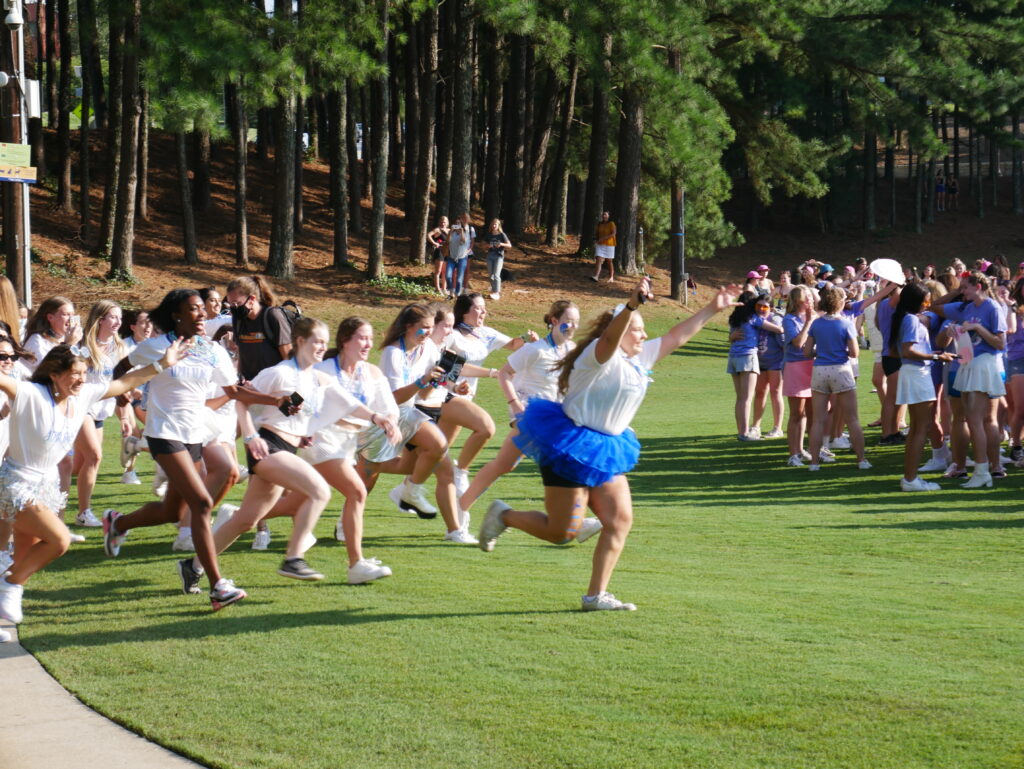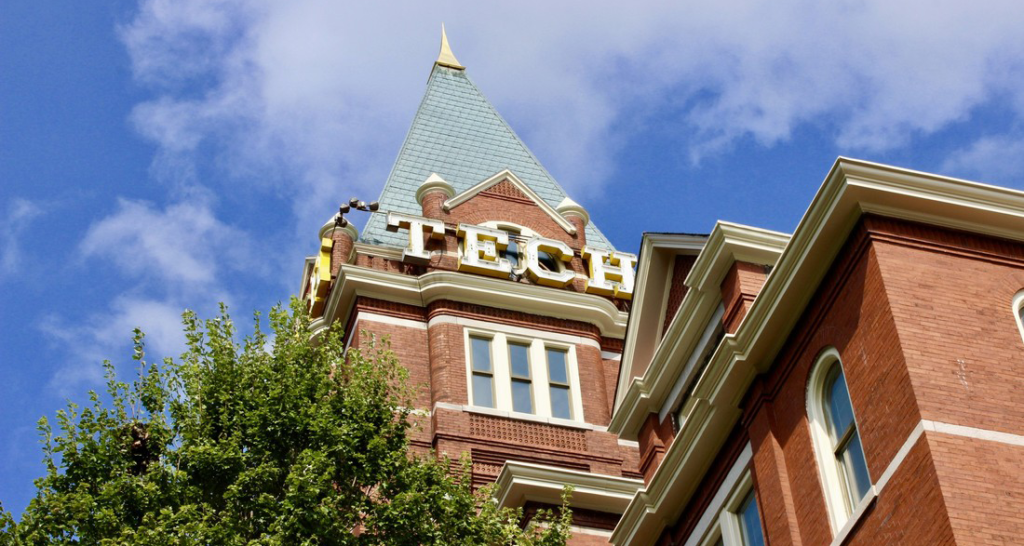Posted on 26 February 2021.

Like most student experiences in the past 11 months, the annual GT Night at the Aquarium looked a little different this year. The event, hosted by the Student Center Programs Committee (SCPC), fell on the brisk evening of Feb. 19, and ran from 6 p.m. until 11 p.m.
Students were sold tickets with specific entry time slots in order to stagnate congestion, and the amount of tickets sold was very limited compared to
previous years.
As students rushed to the entrance to escape the cold, they went through many common COVID-19 protocols.
Overhead announcements asked attendees to observe social distancing and signs on the ground denoted spots in line that were six feet apart.
Also, placards advocated for mask-wearing in the aquarium and hand sanitizer stations were provided throughout the event.
Additionally, an employee checked each person’s temperature before they were able to step in the building.
Every Georgia Aquarium employee and SCPC volunteer wore a mask, and the ticket handlers wore masks and gloves.
A stack of disposable masks laid on the tables in front of them for students to wear.
A separate, limited amount of tickets were also offered for two different dolphin shows at 6:50 p.m. and 8 p.m.
Two fourth-year BIO majors, Bianca McAlister and Detriana Edwards, were in the socially-distanced queue for the show.
“I think it’s pretty good,” McAlister said, when asked how she felt about the COVID protocols in place.
“It’s spaced out, there’s not a lot of people, there’s plexiglass in places necessary.”
As a GT Aquarium Night veteran and an employee of the Georgia Aquarium, McAlister also observed the low amount of traffic compared to previous years.
“[The aquarium]’s pretty big. I work here, and compared to a regular day when it’s literally packed, this is maybe one-fifth of the amount of people normally here,” she said.
Currently, tensions run high across the country as people are becoming more comfortable with hosting events with large groups of people.
In the case of aquarium night, while most other students did not hear of any criticism, Edwards shared that her and McAlister’s mutual friend was not happy about them attending the event.
“Some people [are uncomfortable], I guess just because it’s a confined area, it’s like … the stigma of being in a confined area,” said Edwards. “I think if our friend would have seen what it was like, she would have felt more comfortable.”
The general consensus with the event’s attendees was that the SCPC’s COVID protocols made them feel safe.
“It was the best they could have done given the circumstances,” said a first-year ME student.
“Everything that you have to touch is closed — the stingrays, the starfish — that’s probably the main difference I saw,” a first-year masters student said when comparing this year’s event to previous years.
“I think knowing that it’s a completely Georgia Tech event makes me feel a little bit better because I know that we have the surveillance testing.”
Some students had even received the vaccine before the aquarium event, a promising sign for future large-scale campus functions.
“I got the first dose of Moderna because I’m in an EMS class, and [my friend, Avi Pearlman] has gotten both doses,” said Isha Perry, first-year neuroscience major.
The beginning of vaccine distribution, however, did not affect how safe they felt at the event.
“We feel fine either way being here because everyone gets tested. We get tested twice a week, everybody we know gets tested two times a week,” said Perry.
Other students expressed that there simply were not enough students that have received the vaccine to make a difference.
“I feel like I’ve seen a lot of people not wearing masks these days on campus, but I can’t tell if it’s because they just don’t want to or if they got the vaccine,” a first-year ME student said. “I don’t know, I don’t feel any safer with the vaccine.”
From the perspective of the students who were SCPC volunteers and workers at the event, Tech students were very good about following the rules they had set in place. A fourth-year SCPC volunteer working the tables was positive about student reception to events.
“I think after last semester and seeing how we handled the events, I think a lot of people have been really open to our events this semester,” the volunteer said.
“When [friends] ask me about it, I know the logistics, and I know we’re running way under capacity of what we normally could have here. I know that we’re safe, and the aquarium does a really good job at laying out all the rules.”
When asked if this kind of event could have been hosted last semester before vaccine distribution started, she answered, “I think what [stopped] us from doing an event like this last semester was just experience and just feeling it out.
We could have done Six Flags last semester, and we didn’t, just because we were very new to this event planning with the pandemic, and we didn’t want to do one to this scale.”
Two second-year SCPC volunteers spoke about their experience enforcing the protocols.
“If we were seeing someone who didn’t wear a mask, we told them to put on their mask.
We tell people to stand farther apart, even if they are roommates or friends.
We just want to enforce that and keep everyone safe,” said one of the volunteers.
Her fellow volunteer observed, “I volunteered before the dolphin show, which is a huge event here, and I was actually kind of surprised at how people actually properly wore their mask, properly distanced, and they were really easy to regulate, too.”
In the final hour of the fun-filled night at the aquarium, one of the second-year SCPC volunteers shared what makes them the most happy, saying, “I’ve had a lot of students here be like, ‘Oh, thank you so much for putting this on, we really love it,’ etc … and that makes it all worth it.”



